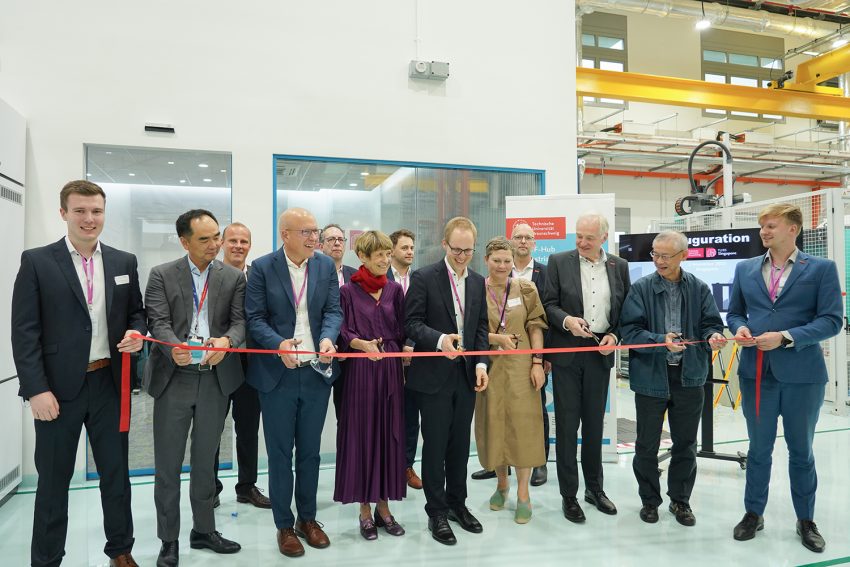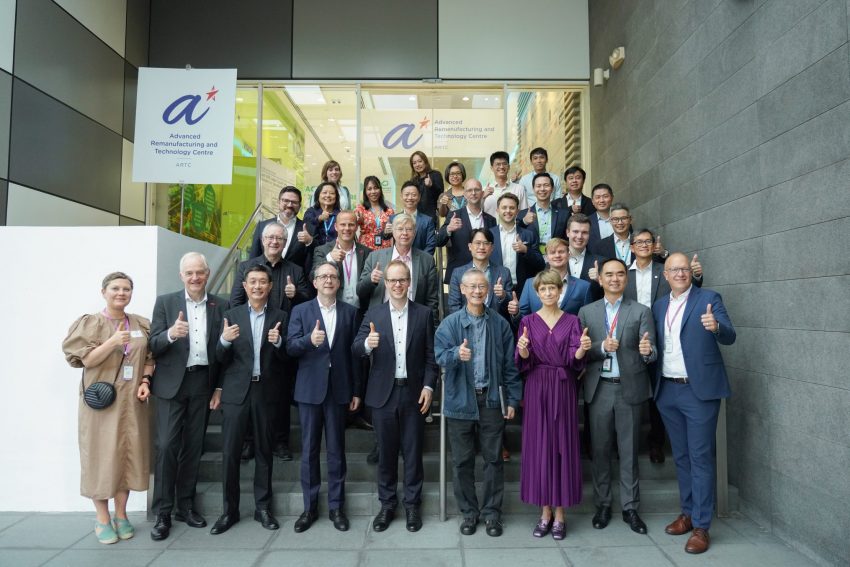Making urban production sustainable and efficient Technische Universität Braunschweig inaugurates research presence in Singapore
The international research presence in Singapore is building a platform for multidisciplinary research with partners in the region. Initially its focus areas will be Smart and Urban Manufacturing, Urban-Industrial Symbiosis, Circular Production and Sustainable Urban Development. With its inauguration, TU Braunschweig is cementing the goal of promoting international cooperation and addressing pressing global challenges.
The inauguration of the research presence of Technische Universität Braunschweig took place in the presence of Dr. Jens Brandenburg, Parliamentary State Secretary to the German Federal Ministry of Education and Research: “Singapore is one of the most innovative countries in the world. It is important for us as the German government to strengthen bilateral relations and promote research cooperation between research institutions in Singapore and Germany. The foundation of this research presence in Singapore is therefore an important milestone for the international visibility of joint research. It shows how important international scientific cooperation is for solving important questions of our time. I am delighted to be able to personally attend the opening of the research presence. I wish the German-Singaporean partnership every success in their joint research.

Dr David Low, Professor Christoph Herrmann, TU Braunschweig President Professor Angela Ittel, Secretary of State Dr Jens Brandenburg, Professor Vanessa Carlow, Vice-President Professor Arno Kwade and Professor Andy Hor cutting the red ribbon tat the opening of TU Braunschweig’s research presence in Singapore. In the background: Dr. Mark Mennenga, Ambassador Dr Norbert Riedel, Eduard Kleinm Olaf Mumm. Holding the Ribbon: Jan Felix Niemeyer and Philipp Grimmel. Photo Credit: A*STAR/SIMTech
Milestone in the history of the university
TU Braunschweig President Prof. Dr. Angela Ittel describes the project as an important milestone in the university’s history: “The strengthening of our bond with Singapore’s dynamic research landscape is an important strategic step for our global research initiatives. Jointly with our partners in Singapore, we will drive innovation in our international network of partners and find sustainable solutions to some of the most pressing global challenges.”
Long Standing Partnership with Singapore Institute of Manufacturing Technology (SIMTech)
The collaboration between the A*STAR Singapore Institute of Manufacturing Technology (SIMTech) and the Chair of Sustainable Manufacturing and Life Cycle Engineering at the Institute of Machine Tools and Production Technology (IWF) headed by Prof. Dr.-Ing. Christoph Herrmann dates back to 2002 . Over the years, the collaboration was gradually intensified and expanded. In 2018, a joint model factory was opened. TU Braunschweig already has an established learning and research environment for the factory of the future with the Learning Factory at IWF. Researchers from both locations have since then been working together on new technologies in the field of Industry 5.0, as well as on energy- and resource-efficient factories.
The development of the research presence was supported by the BMBF with a total sum of 650,000 euros in the course of the project “Industrial Symbiosis and Urban Factories Hub” (ISUrF-Hub, 2017-2024), a project jointly led by the IWF and the Institute for Sustainable Urbanism (ISU) headed by Prof. Dr. Vanessa Carlow. Besides the establishment of a German research presence in the Asia-Pacific research region, the project conducted research into urban-industrial symbiosis and sustainable urban development.

After the inauguration of TU Braunschweig’s Research Presence in Singapore. Photo Credit: A*STAR/SIMTech
Multidisciplinary Research into Sustainable Urban Production and Urban Development
With TU BS Singapore, TU Braunschweig is building a platform for multidisciplinary research. Initially its focus areas will be Smart and Urban Manufacturing, Urban-Industrial Symbiosis, Circular Production and Sustainable Urban Planning. As TU Braunschweig’s Vice President for Technology Transfer and Innovation, Prof. Dr.-Ing. Arno Kwade, a driving figure behind the project notes: “TU Braunschweig is at the forefront of research into efficient, environmentally friendly and economically viable urban and circular production processes. For this and other research topics together with our local partners A*STAR SIMTech and ARTC, we will bring together science, industry and society. The foundation of TU BS Singapore is an important milestone in our commitment to global excellence in research, innovation as well as technology and knowledge transfer.”
In the context of planetary boundaries, a transformation to sustainable production and sustainable urban development is essential. Singapore serves as a living lab for scientists from Braunschweig and Singapore to develop technologies and methods for urban production. A joint research group is furthermore set up to carry out state of the art research in the areas of sustainable cities, energy efficiency in production, and environmental and water technologies. To facilitate knowledge exchange, joint training concepts are being developed to enable students, representatives of business and public administration to attend courses in Germany and Singapore.
